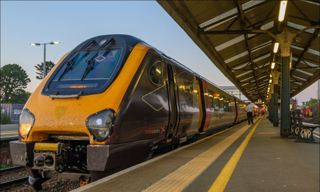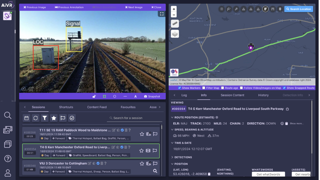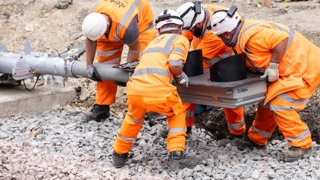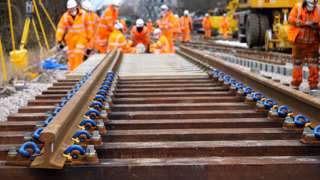The week beginning July 17 started with £6.6 billion worth of HS2 contracts being awarded, as the country forges ahead with a new railway bringing the UK closer together - spreading the wealth via connectivity and jobs.
Yet three days later, plans for electrification were severely scaled back to allow enhanced use of bi-mode. Not necessarily a bad thing, but let’s not pretend this is a carefully considered strategy. Government got here largely by accident. Three high-profile schemes were cancelled, with question marks surrounding other programmes. The highs and lows of the rail industry were felt in less than 96 hours.
There had been rumours surrounding cancellation of the Midland Main Line wiring for months. And questions regarding electrification west of Cardiff had been getting louder, with concern growing that electric trains would be unable to serve Swansea. Further north, alternative-fuel trains will now serve Windermere instead of electric trains.
In a statement on July 20, Secretary of State for Transport Chris Grayling defended the cancellations, saying: “The industry is developing alternative-fuel trains, using battery and hydrogen power. This means that we no longer need to electrify every line to achieve the same significant improvements to journeys, and we will only electrify lines where it delivers a genuine benefit to passengers.”
The following day, in an interview with the Financial Times, Grayling admitted that wiring the trans-Pennine route was unlikely. Bi-mode trains and diesel-hauled coaching stock have already been ordered for that route.
As Philip Haigh writes on pages 6-9, this decision moves the UK away from using generally lighter, cheaper and environmentally friendly trains, to a policy that relies on burning diesel until new technology arrives. As an aside, on July 26, Government announced plans that could lead to the banning of diesel and petrol cars in 2040. By that time, bi-mode trains (equipped with diesel engines) could be plentiful on the UK rail network. Is that really progress and joined-up thinking?
Two years ago, the Government said upgrading and electrifying the MML had a benefit:cost ratio (BCR) of between 4.7 and 7.2. Yet now it claims BCRs are sensitive information. Why the secrecy?
Some did see these problems coming. Five years ago, this very page carried a warning from Nigel Harris that sadly has proved to be correct. RAIL 701 reported on the previous High Level Output Specification (HLOS), when upgrades including MML electrification were planned.
Nigel wrote of the positive atmosphere around rail at the time, and of an optimistic press conference featuring the Transport Secretary Justine Greening and the then Prime Minister David Cameron and deputy PM Nick Clegg. This was a good day for rail… but it came with a warning. Nigel wrote: “It is going to require DfT and ORR to ‘do their bit’ too in sorting out the bureaucratic nonsenses which could wreck alliancing. Because a combination of these efficiencies, NR’s 20% savings and the lower costs of electric trains will all be required to make the HLOS figures work. Rail’s credibility is growing rapidly, as that Prime Ministerial press briefing proved.”
Fast forward five years. No press conference, and Grayling announced the cancellations in a Parliamentary statement on July 20 just as the Commons was about to break up for its summer recess, allowing scant opportunity for debate.
Three days earlier, in a Parliamentary debate on HS2, other MPs had spoken of MML electrification. Indeed, one (Chris Williamson - Labour, Derby North) had praised Grayling for the project. Other schemes look at risk. Will Trans-Pennine wires happen? Wires beyond Didcot to Oxford, the Electric Spine? The Welsh Valleys? There are no answers.
The announcement from the Department for Transport smacks of spin. It referenced enhanced journeys through the introduction of bi-mode trains. Yet on Great Western Railway, where electrification is continuing but not as widespread as planned, bi-modes are now not powerful enough to operate the timetable as planned. The Intercity Express Programme (IEP) trains will need to be modified for more power, to keep to time. GWR has spoken to DfT about this. DfT has acknowledged the conversations, but will not discuss the outcomes.
Government’s fingerprints are all over this. It specified IEP before the final decisions on the GW wires were made. It then watched as Network Rail’s initial £800 million bill for the GW wires rose to £2.8bn, with the prospect of an even higher bill as changes were made to the overhead wire designs and standards.
This is not to say IEP is a bad train. It isn’t. I travelled on one on the main line from Reading to London last year. The ride was smooth and any fears regarding ride quality on diesel power can be dismissed - it was just like an EMU. Nigel has been on an IEP travelling at 100mph when it switched from electric to diesel. It was seamless.
Some may say we should be removing all diesels, but with the removal of cars there would be a net gain. As in all things railway, it’s about trade-offs.
Seemingly the MML will receive new bi-modes from 2022. Currently there are nine High Speed Trains on the line. Dating from the late 1970s, they must be withdrawn by January 1 2020 because they do not meet disability requirements. Sources tell me they have spoken to the DfT regarding this problem, and that work needs to have already started to ensure the sets are ready. Before 2020, there will be 43 rakes of HST stock to modify in a similar fashion. An alternative is surely needed, but one that must be able to replicate the 125mph timings the HSTs achieve.
Just four days later, having hacked back wiring schemes, Grayling then confirmed his commitment to Crossrail 2 and vowed to work with Labour Mayor of London Sadiq Khan to find ways to fund the scheme, which in 2014 had an estimated bill of £30bn.
While their statement suggested that half of the bill will be locally raised money, it still sparked outrage elsewhere. Labour Mayor of Greater Manchester Andy Burnham was incensed: “It is interesting that these statements come after Parliament has risen, which is denying any real scrutiny of these decisions, but when they come to Manchester for their conference I can assure you that they will not be able to avoid these questions.”
Now, more than ever, the railway needs leadership. It needs a voice to fight its cause, to showcase its green credentials against a road industry seemingly moving ahead. It needs a leader who will take the bull by the horns to develop a joined-up plan to get all parties pulling in one direction.
The alternative, I fear, is more cuts, less spending and a turnaround in what has been a positive period for rail. That cannot be allowed to happen.
Nigel Harris is away.
Comment: RAIL 832: August 2 - August 15 2017















Login to comment
Comments
No comments have been made yet.